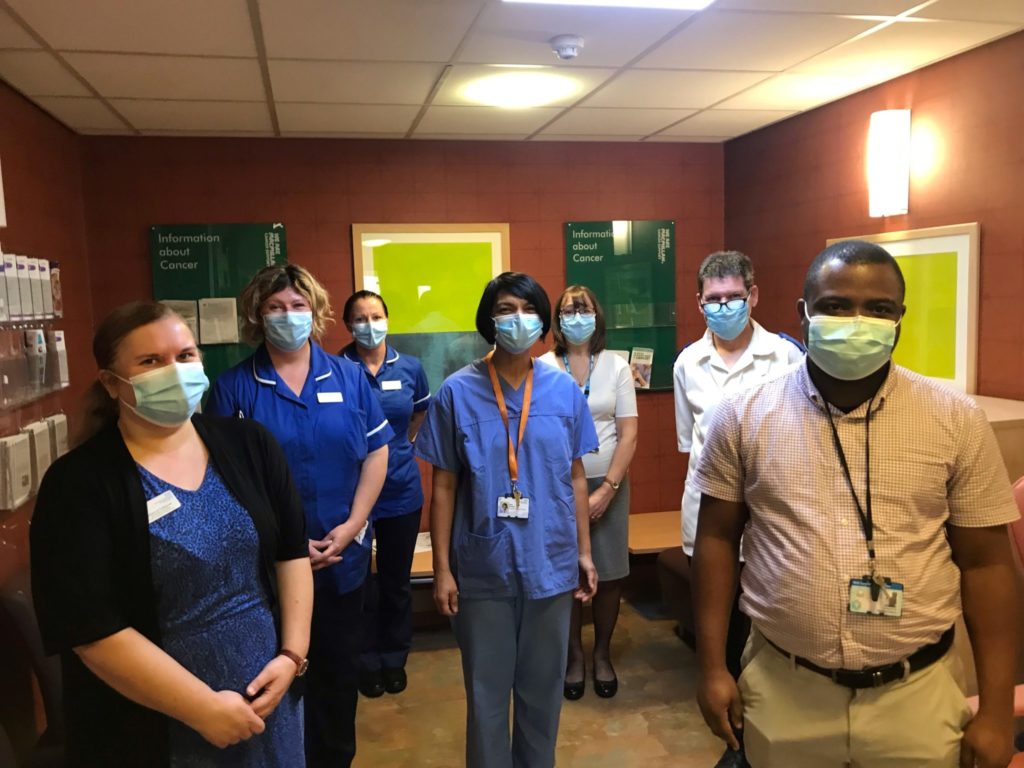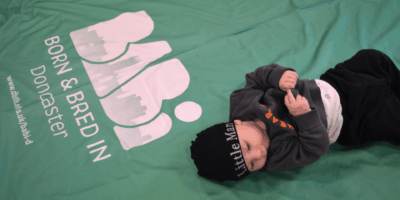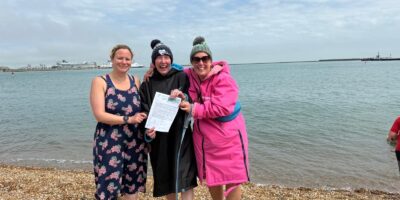On 9 July, Susan was admitted to hospital for a major ‘procedure’ to remove malignant tissue in her colon. Susan had a form of bowel cancer which is one of the most common types of cancer diagnosed in the UK and predominantly affects those aged 60 or over.
Susan commented on the whole experience of her journey, and the work of Miss George, she said: “The morning I went into the operation I was absolutely terrified, but obviously I didn’t show it. She came into see me and said ‘don’t worry, I’m going to look after you’. It was the most moving and wonderful experience because instead of just feeling like a number, I felt like a human being. I think that is such an important thing in this type of situation.”
Susan’s procedure took place during the COVID-19 pandemic, and she was full of praise for how the hospital ensured her safety. She was tested for the virus before her colonoscopy, just prior to her operation, and whilst she was staying in the hospital, ensuring that neither Susan, nor those interacting with Susan, had the potential to spread the illness.
After being released from the outstanding care of the Colorectal Cancer team at the DRI, Susan is now leading a normal life again and has been out exploring the Derwent Valley.
One such recent trip saw her, and her husband David, walk along the Gritstone edge between Curbar and Frogatt. This walk was something that they had dreamt about undertaking as a couple during their time at the hospital, and whilst on the trip they shared stories about the wonderful people that they met at the DRI.
 David said: ‘I would like to convey my most sincere and heartfelt thanks to Miss George and her team for their skill and care in conducting an operation which I still regard as nothing short of miraculous. The diagnosis came as a shock to all of us, friends, family and well-wishers….and to Sue herself! However, the speed at which the medical staff addressed the problem was gratifying after such trauma.
David said: ‘I would like to convey my most sincere and heartfelt thanks to Miss George and her team for their skill and care in conducting an operation which I still regard as nothing short of miraculous. The diagnosis came as a shock to all of us, friends, family and well-wishers….and to Sue herself! However, the speed at which the medical staff addressed the problem was gratifying after such trauma.
“Just as impressive and of real benefit to Sue, was the kindness she received whilst passing through the preparatory stages of the treatment. From the nurses who carried out blood tests to the ones who took the trouble to make telephone calls to check on her well-being. Everyone was so supportive and optimistic. We will never forget Miss George and her team, and will always be indebted to Doncaster Royal Infirmary, you have saved a lady worth saving.”
The three main symptoms of bowel cancer are blood in your poo, a change in your bowel habit, and persistent lower abdominal pain, bloating, or discomfort. Most people who experience these symptoms do not have bowel cancer, however it is vitally important to contact your GP and access services if you have had any of these symptoms for three weeks or more.
Miss Rina George spoke about the likelihood of someone getting this type of cancer. She said: “In the UK you have a 1 in 20 chance of developing Bowel Cancer, its actually very common and you can get it quite young, but the majority of cases are people aged between 60 to 80.
“If you are part of this demographic, I strongly advise people to take part in the national bowel screening program – information for which can be found online. This is where you collect a small sample of poo on a small plastic stick, put it into the sample bottle and post it to a lab for testing once every two years from when you are 60 until you are 75.”
 Susan’s story is a fantastic example of how acting fast when experiencing symptoms can save your life. If you would like to obtain more information about the bowel screening kits, please click here.
Susan’s story is a fantastic example of how acting fast when experiencing symptoms can save your life. If you would like to obtain more information about the bowel screening kits, please click here.
Susan finished by talking about the screening process itself. “The people at the Endoscopy Unit were incredible. I had heard horrific things about this procedure from other people, and that’s what put me off in the past, but the staff there were amazing.
“A lot of people are like me, they are frightened, as some people will tell them that it is terrible, but it really is not.”
More than 90% of people with bowel cancer have 1 of the following combinations of symptoms:
- A persistent change in bowel habit – pooing more often, with looser, runnier poos and sometimes tummy (abdominal) pain
- Blood in the poo without other symptoms of piles (haemorrhoids)– this makes it unlikely the cause is haemorrhoids
- Abdominal pain, discomfort or bloating always brought on by eating – sometimes resulting in a reduction in the amount of food eaten and weight loss
If you are at all concerned about any consistent symptoms you may have, please consultant your local practice.



